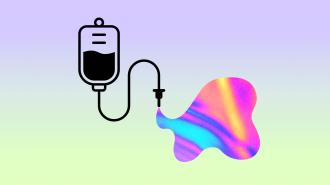DMT, the powerful and short acting psychedelic famed for tales of interdimensional elves, has joined a list of other psychedelics as a potential depression treatment candidate.
Its reputation carries more clout in Drug World than drug development, however; DMT remains relatively understudied compared to psilocybin, ketamine, and MDMA.
That could change soon, as the UK-based biotech Small Pharma is developing a DMT drug candidate for major depressive disorder (MDD). The IV-administered drug (dubbed SPL026), combined with work with a therapist, showed positive results in a phase 2a clinical trial this past winter.
The initially released data showed that one course of SPL026, when combined with therapy, had antidepressant effects out to three months; it was as “good a set of results as we could expect,” Carol Routledge, chief medical and scientific officer for Small, previously told me.
UK-based biotech Small Pharma is developing a DMT drug candidate for major depressive disorder (MDD).
Now, the company has announced results for a six-month, out-of-study follow up. At the half year mark, more than half of the participants who had achieved remission still were in remission.
“We are pleased to see that participants in our study experienced durable relief from their depression for an extended period of time,” Small Pharma CEO George Tziras said.
The trial: The phase 2a trial, which enrolled 34 patients with mild to severe MDD, was conducted in two parts.
In the first part, subjects were split into DMT and placebo groups in a randomized, double-blind study. The second part was an open-label study, meaning everyone knew they were receiving DMT; for participants who had been randomly assigned to the DMT arm in the first part, it was their second dose, while the initial placebo patients received their first dose.
That open label part of the study was designed to help determine the efficacy of one or two dose regimens, as well as track how long the antidepressant effect lasted.
The follow-up: The six-month, out-of-study follow up looked to measure the continued duration of the treatment in the 25 patients who participated in the follow up. The group included 14 patients who had achieved remission during the initial three-month study period, called “prior remitters.”
Of those 14 prior remitters, nine maintained remission at the six-month mark. Overall, 10 of the 25 patients had hit the standard for remission by six months.
“This data indicates that SPL026 can elicit a fast-acting antidepressant response that appears to be enduring in several cases,” Robin Carhart-Harris, director of the psychedelics division at UC-San Francisco’s Weill Institute for Neurosciences, said in the Small Pharma release.
At the half year mark, more than half of the participants who had received DMT and achieved remission in their MDD still were in remission.
Next steps: Small Pharma is preparing to do a larger, phase 2b trial of SPL026, which Routledge told me in February they hope to begin in the first half of the year. This six-month follow-up will be used to help inform that trial.
“As we finalize the design of the Phase IIb study, this data helps to inform our understanding of treatment durability and our approach to patient retreatment within the trial,” Routledge said in the release.
We’d love to hear from you! If you have a comment about this article or if you have a tip for a future Freethink story, please email us at [email protected].






